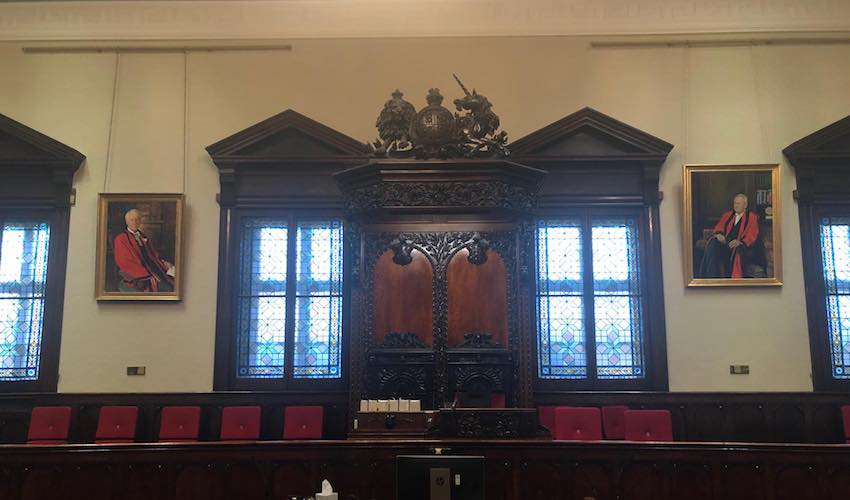

The Government is arguing that a £50,000 fine it was ordered to pay after a school gate fractured and severed a little boy's finger was "manifestly excessive."
The penalty was handed to the States Employment Board (SEB) by the Royal Court earlier this year on the grounds that it had breached Jersey’s Health and Safety regulations.
As the SEB employs all staff members within the relevant Government departments and the school in question, it is legally responsible for the health and safety of any person on the school’s grounds and therefore for the breach leading to the young child's injury.
During the sentencing hearing in May, Crown Advocate Chris Baglin said a child’s left ring finger had got caught in the gap between one of the school’s gates and its frame. The finger was fractured and the tip was severed; although it was retrieved it could not be reattached during surgery.
Pictured: The States Employment Board employs all staff members within the relevant Government departments.
The incident was reported to the Health and Safety Inspectorate (HSI) who commented in a report that “the design of the gate and the specific position of the hinges created a foreseeable finger trap hazard when the gate was opened".
The Court was also told that nine months before the accident, “an email was circulated to all head teachers and senior leads by Nick Jewell, Head of Facilities Management for CYPES [Department of Children, Young People Education and Skills, ed.], expressing concern over five recent reportable finger injuries to children at school and highlighting particular risk factors that schools should be alert to”.
The case was presided over by the Deputy Bailiff, Robert MacRae, sitting with Jurats Rozanne Thomas and Kim Averty.
The Court decided to increase the £20,000 fine suggested by the Crown and fined the Board £50,000. They also ordered they pay the prosecution’s costs to the value of £5,000.

Pictured: The application for leave to apply was heard by the Bailiff, Timothy Le Cocq, and Jurats Elizabeth Dulake, Steven Austin-Vautier and Dr Gareth Hughes.
But yesterday the SEB came back before the Royal Court to argue that the penalty had been too high and that they should be allowed to appeal it.
Representing the States Employment Board, Advocate Debbie Corbel, made an application to the Bailiff, Timothy Le Cocq, and Jurats Elizabeth Dulake, Steven Austin-Vautier and Dr Gareth Hughes.
While she said the SEB did not wish to minimise the child's injuries, she argued that the fine was “manifestly excessive."
She went on to claim that the Royal Court had relied too heavily on English guidelines when considering what fine to impose, ultimately leading it to double the recommended sum.
Advocate Corbel also suggested that the Court hadn’t given enough consideration to the fact the SEB wasn’t the only party responsible for the accident, as the gate itself was inappropriate.
She noted that the SEB hadn’t provided “adequate supervision” of its installation but argued that, having employed expert company St. Helier Ironworks, they couldn’t have been expected to stand over their shoulder while they were doing the work.

Pictured: The Crown Advocate said the Court had “unfettered discretion” when setting sentences.
Crown Advocate Baglin said the Deputy Bailiff had been aware of the role of St. Helier Ironworks in the case.
In the first judgment, he had noted that it couldn’t be argued that the SEB’s sentence should be reduced because the company had not also been prosecuted.
“The SEB is not being prosecuted for the design and installation of these gates,” he wrote. “The Attorney General decided not to prosecute St Helier Ironworks, we are told, because the prosecution test was not met and we simply cannot go behind that. The SEB is being prosecuted exclusively for its own failings and being sentenced as such.
The Crown Advocate said the Court had “unfettered discretion” when setting sentences and could opt to reduce or increase the Crown’s conclusions.
He also reminded that the Health and Safety Law existed to protect people “from the risk of serious harm” and that in this case the risk had been identified as high.
He argued that the Court had been right to characterise the case as an “accident waiting to happen” and the SEB should have “picked up” the risk posed by the gate, which had been “installed and signed off without any oversight”.
The Court will issue their decision about whether to allow the appeal to proceed or not at a later date.
Comments
Comments on this story express the views of the commentator only, not Bailiwick Publishing. We are unable to guarantee the accuracy of any of those comments.